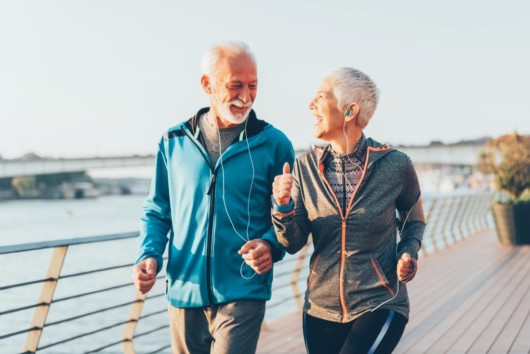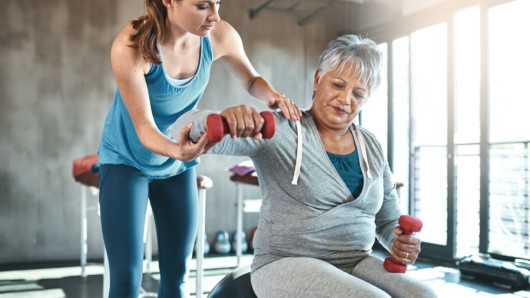When people begin to age, their entire functionality and operating power decrease and get slower. This is mainly because of ageing and the fact that older people start developing health issues and use medications regularly.
Fitness in older age is considered as a miracle as many people think that the only job they have to do in post-retirement is to sit, have tea, and relax with their friends and family. Well, this concept is not entirely true. As you age and grow older, having an active lifestyle has to be an integral part of life. Recently, a Swedish study concluded that having more physical activity from an acceptable age can add some extra years of your life and increase longevity.
As many whiplash doctors and physical therapy experts explain, it is extremely important to keep your body and spine in its natural order and it also allows your heart to be in healthy shape and keeps your mind and mood happy.
Benefits of Exercising for Old People

Enlisted below are some of the benefits of exercising that have both physical and mental impact on the overall health.
1. Helps Lose Weight and Maintain a Decreased Metabolism
Living a healthy lifestyle is a struggle because metabolism gradually decreases with age. Exercise helps to improve metabolism and to develop muscle mass. This allows people to burn more calories.
2. Decreasing Heart Health Issues
Heart diseases are one of the leading causes of deaths in America. People are most prone to obesity because of the type of diet they consume. The CDCP has stated that almost one in four deaths is caused due to the heart issues. Medical experts are working day and night for people and allow them to recognize the dangers of having high blood pressure, blood sugar, and high LDL cholesterol.
3. Allows Maintain Flexibility and Balance
Regular exercise allows the people to improve their overall body strength, flexibility in the usually tense and non-functional muscles, and composure. All this being performed regularly can improve the overall balance, control, and minimize the risk of falling. Being involved in regular strength training routines can also help people ease out chronic issues like arthritis.
4. Helps Alleviate Mood and Reduce Symptoms of Depression
Exercising may have a positive influence on personal mood. Research shows that community workout and fitness classes for elderly individuals and active people will dramatically alleviate symptoms of depression by 30 percent or even more.
The slight change in the signs of depression will help in promoting relatively higher health at a later age. It can help avoid stressful ideas or emotions that is typical in this age.
5. Assists in Improving the Mental Health
Games like chess and Sudoku are quite beneficial for mental health and they allow in keeping the brain in a healthy condition. Many elderly people engage themselves in social activities playing these games.
These are exercising that help your mental health but exercising physically can also help function the brain. With regular exercise, you can support the brain function in diverse ways and also get used to beneficial tasks like multitasking and reducing memory loss and the development of such illnesses like Alzheimer’s, cognitive impairments, and dementia
6. Helps to Prevent Dementia
dementia is a disability disorder that affects many elderly people. With a wide variety of mental conditions known as dementia, there seems to be a great need to learn how the disease can be avoided. Exercising is one method of treatment that will help slow down mental deterioration.
A new survey showed a 37% risk reduction and a 66% reduction in the risk of dementia when elderly individuals exercised. This indicates that each adult should exercise to help minimize the chances of emotional instability and prevent mental illness later on in life.
7. Helps to Maintain a Healthy Lifestyle
Maintaining mental health is extremely important and one of the most desirable things that elderly people live for. It is vital for many older people to maintain an independent and active lifestyle.
Regular exercise can be improved easily by daily exercising and this can also help you improve your overall balance and muscular strength. Many trainers allow the elderly to exercise moderately for at least three to four times a week. Even after 4 weeks, you can feel a considerably positive change in your body.
Exercising regularly is not only good for people who have reached particularly old age. People who are younger might need to consider adding activities in their life so that their older age is much healthier, better, and to prevent from all the diseases that are becoming much common nowadays.
Few Tips That Can Help You Remain Active With Age

The initial phase of maintaining a regular routine with exercising can be quite challenging at any age. And in older age it becomes a little more difficult, taking into account all the muscle sores and aches that might come in the way.
If you are someone who has not been involved in exercising or you are considering yourself as ‘too old’ to work out, it can be a bit of a conflict. You might need to hire someone who can help you in managing and maintaining a workout routine.
Don’t forget to seek an appointment from your regular doctor just to make sure that your health is in a proper condition.
Exercising is extremely important for elderly people. It allows them to maintain their health and stay active in their later on ages. There might be some obstacles initially that can be a bit tough but adding exercise to your routine three times a day will lead to a healthier human being.



